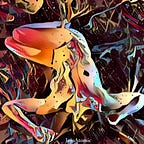A Memoir in Parts (AMIP): Core Wounds
Perhaps to say my picture-perfect life shattered at 13 isn’t quite right. The cracks had started forming long before that, and the pieces did not all burst apart in one sudden explosion, but more so fell to the ground in fragments, each taking with it another disintegrating facet of the life I had known.
My mother was descending into alcoholism as a coping mechanism for her depression. My father, giving up on my mother’s ability to get well, found work out of town and began gradually reducing his presence in our home until he committed fully to living elsewhere. My brother and sister — both older than I — left home during this time, as well. Eventually, my father filed for divorce.
In short, by 14, I was left alone with a depressed, self-medicating alcoholic of mother who was barely present in my life and became only less-so in the years to come. Enter my core abandonment wounds, which would — as such wounds often do — become the ghosts that haunted me ever after. Depression, self-hate, and hopelessness.
I don’t believe these traits came naturally to me. Not, at least, in the biochemical sense. Perhaps they existed latently, as a pre-disposition. My personal barometer for the destructiveness of my emotional and interpersonal environment, reinforced by the worldview I absorbed from my upbringing (a gilded, Bible-belt-surface-level understanding of Christianity) and the behaviors I witnessed around me.
It didn’t help that these wounds were forming just as I hit the already-traumatizing event of puberty, and would be reinforced by a number of losses and life changes over the next several years. My mother and I moved from my childhood home to an apartment in Nashville for a brief limbo and then to a smaller house in Franklin. My father moved to even farther away to Texas. I had a falling out with one of my best friends, who (understandably) couldn’t handle my depressive moods. Another of my best friends was busy with hockey and the infatuation of her new boyfriend. My beloved dog passed away. My mother was disappearing day by day, along with my respect for her. The few people who could have intervened and helped me make better sense of my situation and my emotions failed to show up for me as I needed them — either because they didn’t know how to, or they didn’t have the time.
I felt utterly worthless.
I hit rock-bottom of my depressive hole. I thought I wanted to kill myself. Actually, I thought that I should want to kill myself. But I didn’t, really. Although my faith was ill-informed at the time, it saved me from taking the idea of suicide too seriously. I knew my life was not my own. I also knew, somehow, that my suicide would destroy my family utterly. As Tim Ferris describes, I would have been strapping a bomb to myself and walking into a room full of everyone I loved.
I felt weak, ironically, for not being more willing to take myself out of this world. Now I see it as Grace. And since I had to face the reality that I would not kill myself, I became determined to overcome the depressive moods that so frequently debilitated me. They made me useless, and I couldn’t abide that uselessness anymore.
Overcoming those demons has been a decades-long process that has progressed through many stages, but once I began the hardest work, I found myself more able to tap into the joyful parts of myself. Life became much more fun, despite the challenges, and the journey began in earnest.
